
[ad_1]
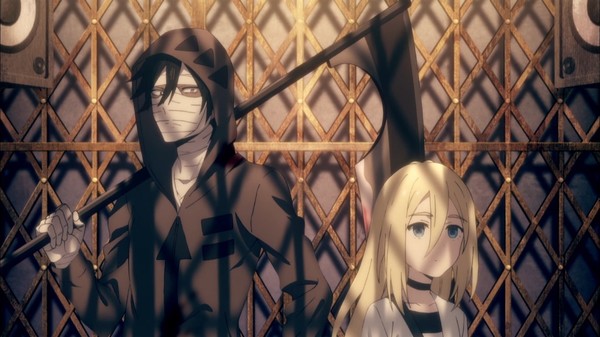
Angels of Death is a spooky buddy-cop thriller about a young woman with a death wish and an edgy murderer escaping a hospital run by serial killers. Premiering in 2018, it ran for sixteen episodes and spawned this great installment of This Week in Anime. While I’ve never watched an episode of the series, I find Angels of Death fascinating if just for this reason: the story originates from a serialized horror game made in the hobbyist game-making software RPG Maker VX. RPG Maker software (in its many varieties, ranging in English from 2000 to the most recent MZ) is designed such that learning code is unnecessary to create a game with it. While Angels of Death‘s creator Makoto Sanada had released a game previously, the horror title Forest of Drizzling Rain, we can assume that as a solo creator they faced significant challenges in making an entire game on their own, much less promoting it to others. Yet upon its release in 2015, Angels of Death inspired not just light novel and manga adaptations released a year later, but also the aforementioned anime adaptation which aired to Japanese fans online as well as to English-speaking audiences on Crunchyroll and Funimation. Not bad for an indie project originally released for free!
I’ve seen some dismiss RPG Maker games as buggy Dragon Quest clones developed by amateurs. Certainly anyone who’s worked with the engine will tell you that even without having to code, making RPG Maker games can be a pain in the neck. But RPG Maker games are both influential and important to the history of Japanese indie games as a whole. The release of 1996’s prize-winning horror game Corpse Party (originally made in RPG Tsukuru Dante 98, the oldest maker of them all) predates the first of Team Shanghai Alice’s beloved Touhou shooters for the PC-98. Years later, the foreboding emptiness of 2004’s exploration game Yume Nikki made such an impact on players and developers that we’re still seeing its aftershocks across the field of indie game development. Today the shocks of horror games developed in the engine have found an audience via Let’s Plays and VTubers. Even some traditional RPGs (like Ruina: Fairy Tale of the Forgotten Ruins, just translated into English this year) released in the engine impress in their idiosyncratic design and disregard of marketable trends.
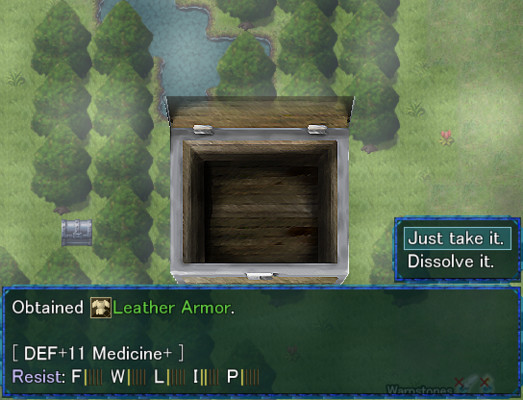
Yet much of the history of RPG Maker games developed in Japanese remains inaccessible to English language speakers. There are, of course, exceptions. Some Japanese fans (who encountered the scene via playing other niche Japanese media, like visual novels) have written up pieces on individual communities like the VIPRPG movement, superficially generic games that push the engine’s capabilities to the max. Others write up what details they uncover through the process of translation, such as Samuel Messnyr’s translation notes for the RPG Maker title Azusa 999. But even more is obscured, buried across multiple free game sites that are routinely ignored by the English-speaking press. Regardless of the quality of these games, I believe that they (along with those produced in the English-language scene, and those in similarly active French, Italian, and German communities) deserve documentation, or at least preservation.
There are dedicated souls who labor to translate games made in RPG Maker (and similar engines, such as Wolf RPG Editor) into English. Of these few, vgperson is one of the most prolific and arguably the best. Her work includes a murderer’s row of popular titles, including:
- the charming but spooky art museum horror story Ib, where you grow to care about the cast as much as you fear the next unexpected shock
- the treacherous death trap extravaganza The Witch’s House, devoted to killing the player over and over again
- the ongoing visual novel series Your Turn to Die, whose eye-catching art design and many exciting twists and turns have earned favorable comparisons to the Danganronpa series
- And the twisted END ROLL, a story-driven RPG that balances turn-based battles with sickening horror
Translating is hard work, and doing so within the constraints of the RPG Maker engine adds an additional level of challenge. I reached out to vgperson to see what I could learn about her process, and she was gracious enough to reply. Her answers, edited for clarity and content, may be found below.
When did you first discover RPG Maker games? Do you remember the first one you played?
I’ve known about RPG Maker for a long time, and messed with it when I was younger in a non-serious capacity. I played some Western-made RPG Maker games around that time, but nothing noteworthy that I can remember. I also played Yume Nikki at some point, but didn’t really go anywhere from there.
As I began learning Japanese, I started to frequent Niconico Douga [a Japanese video streaming site comparable to YouTube in the United States] and decided to try translating some songs from there, leading to a lot of Vocaloid translations. Between this and being a Touhou fan, I came across Touhou Mother, a Touhou/Earthbound crossover fan-game which posted videos of the story as it was being made, and decided I’d translate that. Touhou-A-Live, a Live-A-Live crossover made by a different creator, was released not long after. [Live-A-Live is a SNES RPG that has never officially been translated into English, but earned a cult following among English-language fans through a fan translation.]
I later came across Ib from seeing it being played on Niconico, and really liked it, so I decided to branch out by translating that. The popularity it found led to me translating other RPG Maker horror games released around that time, and digging up some older ones as well.
You’ve translated some of the best-known story-focused RPG Maker games, like Ib, The Witch’s House and Wadanohara and the Great Blue Sea. How do you choose which games to translate?
Game or otherwise, I translate what catches my interest and I feel would interest others. Sometimes it’s been what’s popular, while other times I’ve dug through sites like Freem looking for new and unknown treasures (often to no avail, but then sometimes, there’s END ROLL). I’m also likely to keep up with new works from the same creators – fans often want them translated as well.
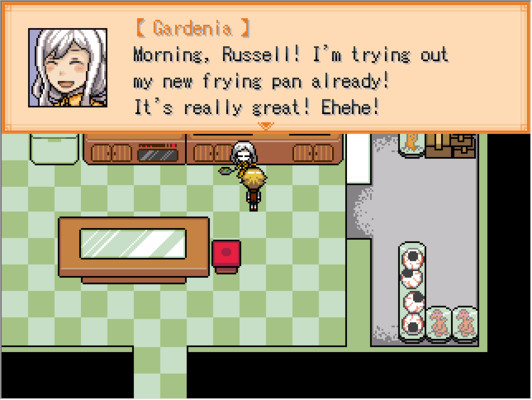
What is your translation process? What about translation do you wish more folks knew about?
My process is usually very basic: do a playthrough in Japanese, translate text in the game roughly in order, and do playtesting along the way to check and revise the translation. All I can really say about translation is the sort of thing that’s already been said by lots of professionals in the field, particularly Japanese translators: Translation is an art, and translators are writers in their own right trying to convey the same ideas and nuance the original text conveyed in a new language, not just directly mapping words.
Translating games is a lot of work, and the RPG Maker engine presents specific difficulties even at the best of times. Do you find that games made in earlier engines like 2000 are more or less challenging to translate than games made in VX or MV/Z? How about other RPG making engines like WOLF RPG, etc?
Earlier versions of RPG Maker have technical quirks and limitations, such as having to deal with limited color depths for images and hardcoded text for the battle/menu system, that require a bit more work to translate. Otherwise, all the RPG Maker engines (and Wolf RPG Editor) are about equal in the respect of having to look through events to find where the text is. Having a background in programming, I’ve made various programs for myself over the years with helpful functions, such as extracting only the text strings (which also helps for spell-checking and such) so I can work more conveniently in a regular text editor
What is it about RPG horror/story games that appeals to you most?
I like story-focused games in general, and the ways people tell stories in the framework of a game. The engine lending itself to relatively easy editing is just a bonus, and a big reason why I decided to translate Touhou Mother – because it was entirely within my ability (incomplete grasp of Japanese at the time aside.) But it certainly is interesting how a lot of these games work within an engine ostensibly for RPGs to make something that’s not an RPG, or at least doesn’t make use of the built-in battle system, or only treats it as a secondary element.
Games like Ib not only aimed to make effective 2D horror when the most popular games in that genre were 3D. They did so in an RPG engine with four-directional movement, graphical restrictions from the year 2000, and limited ability to code anything the engine didn’t intend for. And they were so successful at it that a lot of people were motivated to make games in that format, and make it a genre. While some have made RPG Maker games with action elements to varying degrees of success, I think it’s an interesting and accessible format for creators to tell stories that don’t need a lot of action, in which you’re also able to have exploration and puzzle elements.
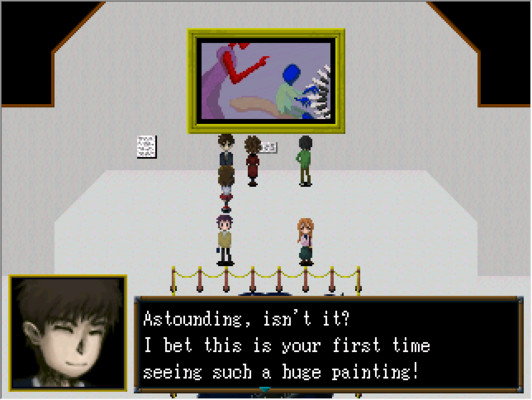
Games like Segawa’s END ROLL blur the line between RPG horror games and more traditional turn-based RPGs. Do you see it as distinct from survival horror-like games like Ib, or more alike than unlike?
As indicated by the way I categorize games on my site, I think RPG Maker games can fit into a variety of gameplay genres. Of course, I know people have been confused by me not putting games with dark themes in the “horror” category (now “Horror-Style Exploration” for clarity), since they’re looking at the content rather than the style of gameplay. But there are enough games explicitly going for “horror game” in a similar model to Ib that it feels like a reasonable distinction to put those together, and consider less atmospheric or puzzle-oriented games separate. As for what I consider a full-on “RPG,” END ROLL certainly has more battling and strategy than, say, LiEat. But seen alongside Segawa’s other games that don’t have combat, these battles feel foremost like a complement to the story. In comparison, the games in the RPG category are too in-depth or put those elements too front-and-center to not call them that. It’s all pretty subjective, but I’ve put thought into it.
Where do you see RPG Maker games in the larger Japanese indie scene? How about kaizo rom hacks, fangames and other “doujin projects?”
Even as new engines make it easier to make independent games, RPG Maker and Wolf RPG Editor seem to remain extremely popular for freeware creators in Japan making original games. It helps that the engines themselves are the basis of a popular format, so of course you’d use them to emulate that style. Niconico‘s Game Atsumaru has encouraged use of RPG Maker MV/MZ by providing a platform for accessible browser versions – the popularity of Your Turn to Die in any language owes a lot to that.
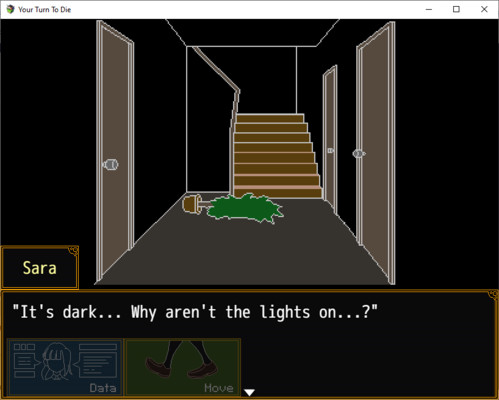
What most excites you in the JP RPG Maker scene today?
I’ve honestly been too busy lately to necessarily stay current with recent developments, as I’m mostly just keeping up with the creators I already know. But with the engines themselves being pretty static and major genre trends being rare, it all just comes down to what people are making. So I suppose I can at least say I’m excited that games like Your Turn to Die, Witch’s Heart, and Segawa’s games are being made, all telling amazing stories in totally different ways, and all with different approaches to using the engine, too.
What game in your catalog of translated work do you think more folks should be paying attention to? Which of your own games (All To Get Her, etc.) would you most recommend to curious new players?
My game translations that feel most undeservedly slept-on are Faraway Story (as a large-scale game) and At the Tale End (as a small-scale game). Both have pretty interesting stories, and Faraway Story has a whole lot of mechanical depth. While I’d of course like people to try All To Get Her, the obvious recommendation for my original games relative to RPG Maker is Libretta, since it’s effectively my own take on how to make an RPG Maker-style horror game.
Adam W is a bookseller by day, features writer at Crunchyroll by night. When he isn’t howling the theme song from Ultraman Nexus, he sporadically contributes with a loose coalition of friends to a blog called Isn’t it Electrifying? You can find him on Twitter at @wendeego
[ad_2]





